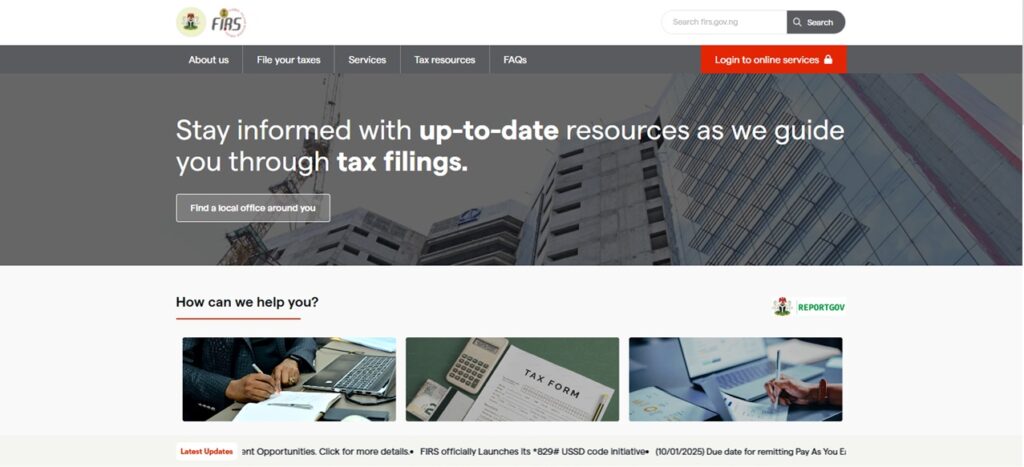Value Added Tax (VAT) is an integral part of Nigeria’s tax system, applying to most goods and services consumed within the country. If you’re a business owner in Nigeria, registering for VAT is both a legal obligation and a strategic move to enhance credibility. This comprehensive guide will walk you through how to register for VAT online in Nigeria, including the latest updates and insights from the Federal Inland Revenue Service (FIRS).
What is VAT, and Who Needs to Register?
VAT is a consumption tax charged at 7.5% on the supply of taxable goods and services in Nigeria. According to the VAT Act:
- Businesses with an annual turnover of N25 million or more must register for VAT.
- Businesses below the threshold can still voluntarily register, providing additional benefits such as tax credibility and the ability to reclaim VAT on eligible expenses.
Key Exemptions:
Certain goods and services are exempt from VAT, such as basic food items, medical services, and educational materials. For a full list, refer to the VAT Act’s First Schedule.
Why Register for VAT?
- Legal Compliance: Avoid hefty penalties, including N50,000 for the first month of default and N25,000 for subsequent months.
- Credibility: Show clients and partners your commitment to operating transparently.
- Tax Benefits: Reclaim VAT paid on business expenses like equipment, raw materials, and professional services.
- Growth Opportunities: If you’re exploring ways to expand your income streams, such as venturing into profitable side hustles, check out our guide on the 10 Best Online Side Hustles in Nigeria to boost your financial potential while staying tax-compliant.
Steps to Register for VAT Online in Nigeria

1. Visit the FIRS Website
Go to the official FIRS website (firs.gov.ng) and navigate to the VAT section. This platform facilitates online registration and other tax-related activities.
2. Obtain a Tax Identification Number (TIN)
Before registering for VAT, ensure your business has a TIN. If not, apply for one on the FIRS portal.
3. Complete the VAT Registration Form (Form 001)
Download and fill out Form 001. Provide accurate details matching your business registration documents.
4. Prepare the Required Documents
You’ll need:
- Business Incorporation Certificate (for registered businesses).
- Valid ID (for sole proprietors).
- Formal Application Letter addressed to FIRS, requesting VAT registration.
5. Submit Your Application
Submit the completed form and supporting documents via the online portal or at a nearby FIRS office. The FIRS may request additional verification.
6. Receive Your VAT Certificate
Once approved, the FIRS will issue your VAT registration certificate, which includes your VAT Identification Number (VATIN).
Key VAT Compliance Requirements
- File Monthly Returns
Registered businesses must file VAT returns using the appropriate forms (e.g., VAT 002) by the 21st of every month. - Charge and Collect VAT
Charge 7.5% VAT on taxable goods and services and remit the collected VAT to the FIRS. - Keep Accurate Records
Maintain detailed records of VAT-charged sales and VAT-inclusive purchases for auditing purposes.
Common VAT Exemptions in Nigeria
The following goods and services are exempt from VAT, according to the VAT Act’s First Schedule:
Goods
- Basic food items.
- Medical and pharmaceutical products.
- Educational materials (e.g., books).
- Baby products.
Services
- Medical services.
- Educational services (e.g., tuition fees).
- Exports of goods and services.
For the full list, consult the VAT Act or FIRS Information Circular.

Frequently Asked Questions (FAQs)
1. What is the VAT rate in Nigeria?
The VAT rate is 7.5%, effective since February 1, 2020.
2. What happens if I fail to register for VAT?
Penalties include:
- N50,000 for the first month of default.
- N25,000 for each subsequent month.
3. Do small businesses with a turnover below N25 million need to register?
Registration is mandatory only for businesses with a turnover of N25 million or more. However, businesses below this threshold can voluntarily register to enjoy benefits such as input VAT claims.
4. Are all goods and services subject to VAT?
No. Some goods and services, such as basic food items, medical services, and educational materials, are VAT-exempt.
5. What is the penalty for late filing of VAT returns?
The penalty for late filing is:
- N50,000 for the first month.
- N25,000 for subsequent months.
6. Can VAT be charged on exported goods?
No. All exported goods and services are VAT-exempt in Nigeria.
7. How is VAT calculated?
VAT is calculated as 7.5% of the value of taxable goods or services supplied. For example, if a service is worth N100,000, VAT would be N7,500.
8. Can I reclaim VAT on all purchases?
Input VAT can only be reclaimed on expenses directly related to taxable supplies. VAT paid on exempt items cannot be reclaimed.
9. How do I know if I’ve reached the N25 million turnover threshold?
The threshold is calculated based on the total taxable supplies made within a calendar year. If you expect to reach this threshold, you must immediately register for VAT.
10. How can non-resident companies comply with VAT in Nigeria?
Non-resident companies must register for VAT, issue VAT-inclusive invoices, and may appoint a representative in Nigeria for tax obligations
Conclusion
Registering for VAT in Nigeria is a straightforward process if you follow the outlined steps. Beyond ensuring compliance with legal requirements, VAT registration can significantly enhance your business credibility, demonstrating professionalism and fostering trust with clients and partners. Moreover, it opens the door to potential tax-saving opportunities, allowing your business to optimize its financial operations. Staying proactive about your tax obligations is essential to avoid penalties and maintain a positive relationship with the Federal Inland Revenue Service (FIRS). Always ensure that you adhere strictly to FIRS guidelines to enjoy a seamless experience throughout the process.
If you encounter any challenges, need further clarification, or find it difficult to complete the registration process on your own, help is readily available. You can visit the nearest FIRS office for assistance, where officials are available to guide you through the process step-by-step. Alternatively, consult a tax professional or a trusted business advisor to ensure everything is done correctly. Taking the time to address your VAT registration properly will set your business on the right path for sustained growth and success.
For more tips on business compliance and tax strategies, keep visiting our blog!





Nice Article!